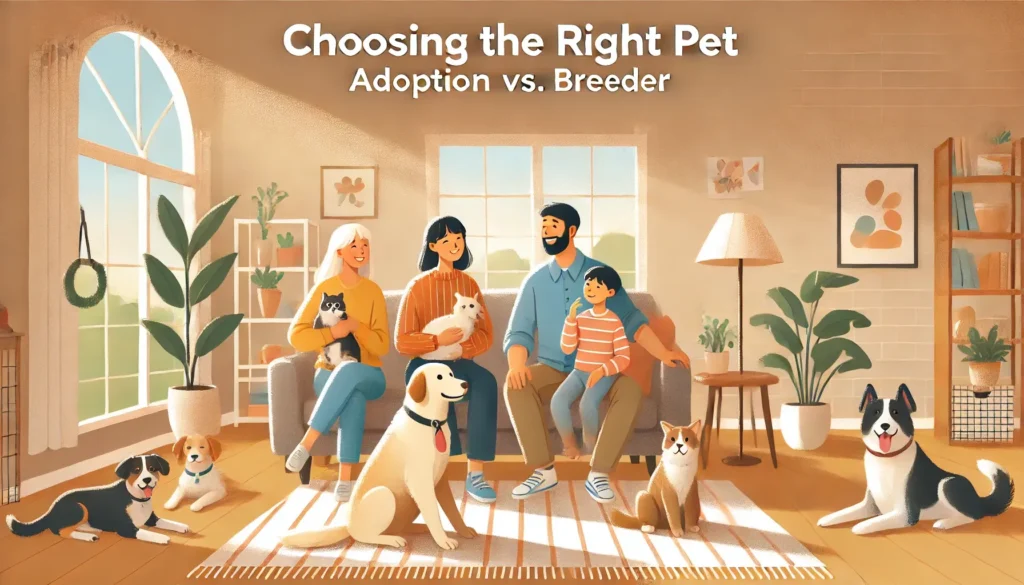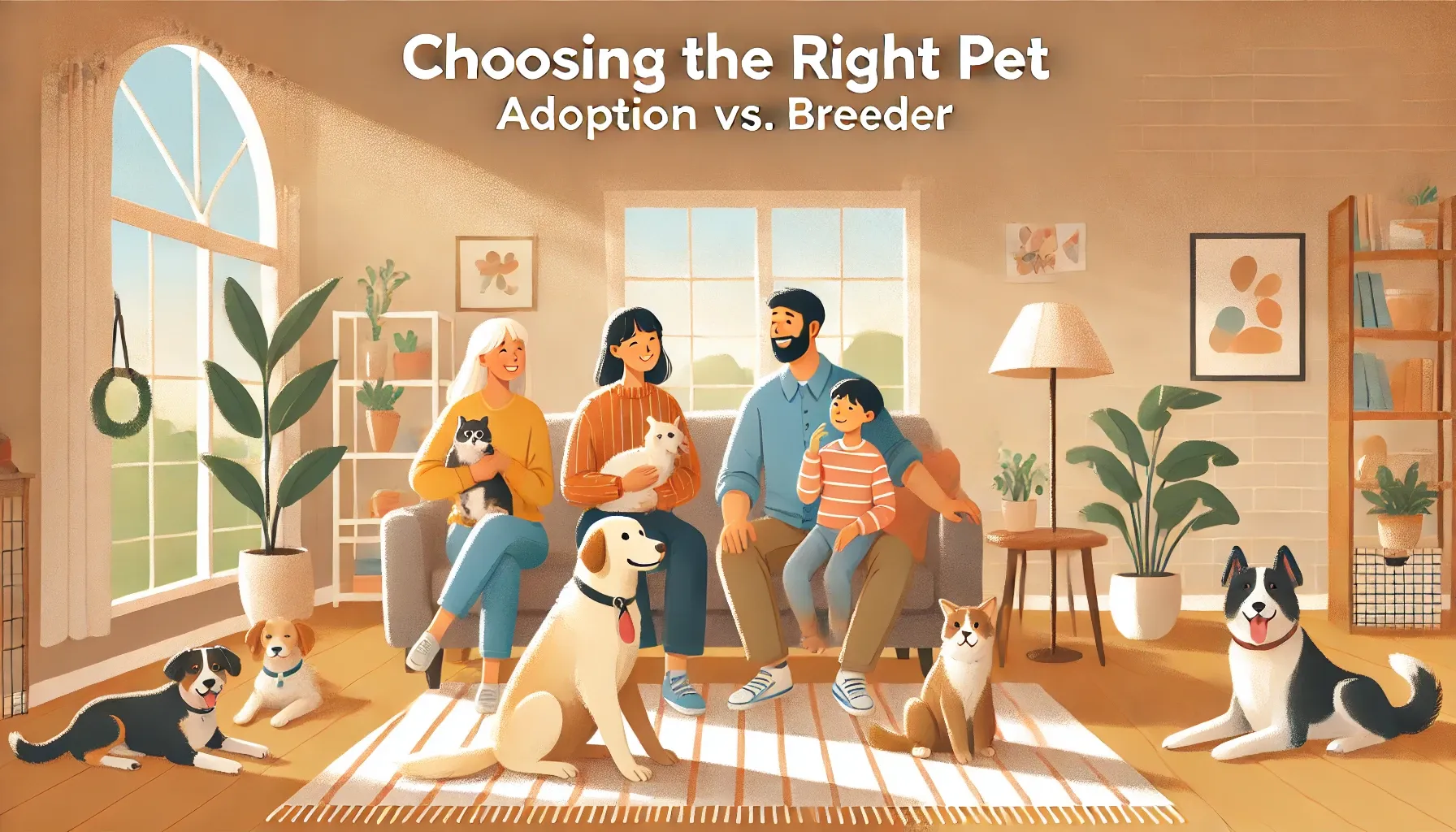How to Choose the Right Pet for Your Family: Bringing a pet into your family is a heartwarming and life-changing decision. A pet can bring companionship, joy, and endless love.
However, one of the most significant choices you’ll face is whether to adopt a pet from a shelter or purchase one from a breeder. This decision is pivotal, and understanding the differences between the two can help you make the best choice for your family.
Also Read : The Best Pet-Friendly Hotels and Resorts for 2025
How to Choose the Right Pet for Your Family

Adoption: A Second Chance for Animals
Adopting a pet from a shelter or rescue organization is an act of kindness that gives animals a second chance at life. Shelters are filled with pets looking for loving homes, ranging from dogs and cats to rabbits, birds, and more.
Also Read : Top 10 Dog Foods Recommended by Veterinarians in 2025
Pros of Adopting a Pet
- Saving Lives: According to the ASPCA, approximately 6.3 million companion animals enter U.S. shelters each year. By adopting, you are directly saving a life and making room for another animal in need.
- Cost-Effective: Adoption fees are generally much lower than the cost of purchasing from a breeder. These fees often include initial vaccinations, spaying/neutering, and sometimes even microchipping.
- Diverse Selection: Shelters house animals of all ages, sizes, breeds, and temperaments, giving you a wide variety to choose from.
- Supporting Ethical Practices: By adopting, you help combat unethical breeding practices and reduce the demand for puppy mills.
- Emotional Fulfillment: Adopting a pet provides a sense of fulfillment, knowing you’ve given an animal a better life.
Cons of Adopting a Pet
- Limited Background Information: Shelter animals may have unknown histories, including past traumas or health issues.
- Behavioral Challenges: Some adopted pets may require extra training or patience to adapt to their new environment.
- Availability of Specific Breeds: If you’re looking for a particular breed, it may be harder to find in a shelter.
Buying from a Breeder: A Tailored Choice
Purchasing a pet from a reputable breeder is another popular option. Breeders specialize in specific breeds and often focus on preserving particular traits and characteristics.
Pros of Buying from a Breeder
- Predictability: Breeders can provide detailed information about a pet’s lineage, temperament, and health history, making it easier to predict how the pet will fit into your family.
- Access to Specific Breeds: If your heart is set on a specific breed, breeders are often the best option.
- Support and Guidance: Reputable breeders offer ongoing support and advice, especially for first-time pet owners.
- Early Socialization: Puppies from breeders are often socialized from a young age, making them easier to train and integrate into family life.
Cons of Buying from a Breeder
- Cost: Purchasing from a breeder can be expensive, with prices ranging from hundreds to thousands of dollars, depending on the breed.
- Ethical Concerns: Not all breeders are reputable. Some operate puppy mills, prioritizing profit over the well-being of animals.
- Overpopulation Issue: Buying from breeders doesn’t address the issue of overpopulation and the high number of animals in shelters.
- Long Wait Times: Popular breeders may have long waiting lists, delaying your pet adoption process.
Factors to Consider When Choosing Between Adoption and a Breeder
1. Lifestyle and Family Needs
Evaluate your family’s lifestyle, activity level, and preferences. Shelters often have mixed breeds, which can sometimes offer the best of both worlds in terms of temperament and adaptability. Breeders, on the other hand, can help you choose a pet whose traits align with your lifestyle.
2. Budget
Adoption is typically more affordable than buying from a breeder. However, regardless of your choice, ensure you budget for ongoing expenses such as food, grooming, and veterinary care.
3. Health and Genetics
While breeders provide detailed health histories, shelter pets can be equally healthy with proper care. Some shelters also perform thorough health screenings before adoption.
4. Time Commitment
Consider the time required for training and care. Puppies, whether adopted or purchased, require significant attention. Older pets from shelters may already be trained, saving time and effort.
5. Ethical Considerations
Adopting supports ethical practices and reduces the demand for unethical breeding. If purchasing from a breeder, ensure they follow humane and responsible breeding practices.
How to Choose the Right Option
- Research Thoroughly: Whether you’re adopting or buying, research shelters and breeders extensively. Visit in person, ask questions, and read reviews.
- Assess Compatibility: Spend time with the pet before making a decision. Observe their behavior, energy level, and interaction with your family.
- Consult Professionals: Veterinarians and pet trainers can provide valuable insights into the pet’s needs and compatibility with your family.
- Visit Multiple Places: Don’t rush the decision. Visit multiple shelters or breeders to explore your options.
Conclusion
Choosing between adoption and buying from a breeder is a deeply personal decision. Both options have unique advantages and challenges. Adopting a pet gives a second chance to animals in need and supports ethical practices, while buying from a reputable breeder ensures predictability and specific traits. By weighing the pros and cons and considering your family’s needs, you can make an informed decision that brings endless joy to your home.
Remember, the most important factor is providing a loving, safe, and caring environment for your new furry family member. Regardless of where your pet comes from, the love and companionship they bring will make the journey worthwhile.
FAQs
1. Can I find purebred pets at shelters?
Yes, many shelters and rescue organizations have purebred pets available for adoption. Breed-specific rescue groups are another great option if you’re looking for a particular breed.
2. How do I ensure a breeder is reputable?
To ensure a breeder is reputable, visit their facility, ask for references, and inquire about health screenings and certifications. Avoid breeders who cannot provide detailed health records or who seem more focused on profit than animal welfare.
3. Are shelter pets healthy?
Shelter pets often receive medical evaluations, vaccinations, and treatments before being adopted. While some may have pre-existing conditions, many are perfectly healthy and ready for a loving home.
4. Is adopting a pet suitable for first-time pet owners?
Yes, shelters often provide support and guidance to first-time pet owners. They can help match you with a pet that suits your experience level and lifestyle.








